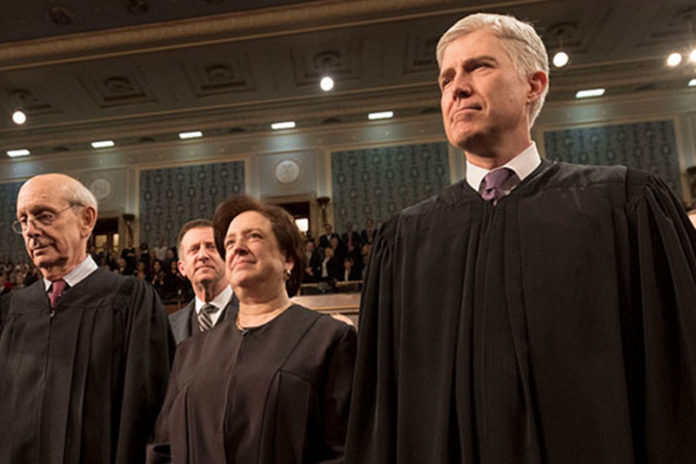President Trump’s Supreme Court Justice, Neil Gorsuch cast the deciding vote on Tuesday on a key case involving the deportation of illegals. His decision turned the court to the liberal side on the case.
In the majority opinion, Justice Elena Kagan leaned on a 2015 ruling by the court. The ruling stated that a similar article in the ACCA (Armed Career Criminal Act) that distinct a “violent felony” stood unconstitutionally invalid for vagueness.
Kagan stated that the INA provision, just as the ACCA provision, outlining a wrongdoing of violence “requires a court to picture the kind of conduct that the crime involves in ‘the ordinary case,’ and to judge whether that abstraction’ presents some not-well-specified-yet-sufficiently large degree of risk.”
Therefore, Kagan said INA’s provision generates, as did ACCA’s residual clause, “more unpredictability and arbitrariness than the Due Process Clause tolerates.”
Justice Neil Gorsuch stated prior to the American Revolution, the misconduct of treason was so capaciously interpreted that the sheer expression of disapproved opinions could call transportation or death.
“The founders cited the crown’s abuse of ‘pretended’ crimes like this as one of their reasons for revolution,” Gorsuch said, quoting the Declaration of Independence.
“Today’s vague laws may not be as invidious, but they can invite the exercise of arbitrary power all the same — by leaving the people in the dark about what the law demands and allowing prosecutors and courts to make it up. The law before us today is such a law.”
The Justice Department has defended the federal law under both, Barack Obama’s and Donald Trump’s administrations.
John Roberts, the Chief Justice wrote a disputing opinion, which Justice Samuel Alito, Clarence Thomas, and Anthony Kennedy joined.
He stated the ACCA clause led the reader to deliberate whether the wrongdoer’s conduct portrayed a “potential risk” of harm.
“On the other hand,” he stated the INA clause, “asks about ‘risk’ alone, a familiar concept of everyday life. It, therefore, calls for a commonsense inquiry that does not compel a court to venture beyond the offense elements to consider contingent and remote possibilities.”
Josh Rosenkranz, attorney for Dimya, applauded the court’s decision. “The Supreme Court delivered a resounding message today: You can’t banish a person from his home and family without clear lines, announced up front,” he stated.
“Congress cannot write a mushy standard that leaves it to unaccountable immigration officials and judges to make it up as they go along.”
Josh Rosenkranz, the Justice Department Spokesman explained the Administration’s plan to deal with this latest ruling. “The Justice Department believes that certain crimes committed by an illegal alien, visa holder, or an alien otherwise granted lawful status in the United States, should trigger their removal,” Rosenkranz said in his statement.
“Therefore, we call on Congress to close criminal alien loopholes to ensure that criminal aliens who commit those crimes – for example, burglary in many states, drug trafficking in Florida, and even sexual abuse of a minor in New Jersey – are not able to avoid the consequences that should come with breaking our nation’s laws.”































